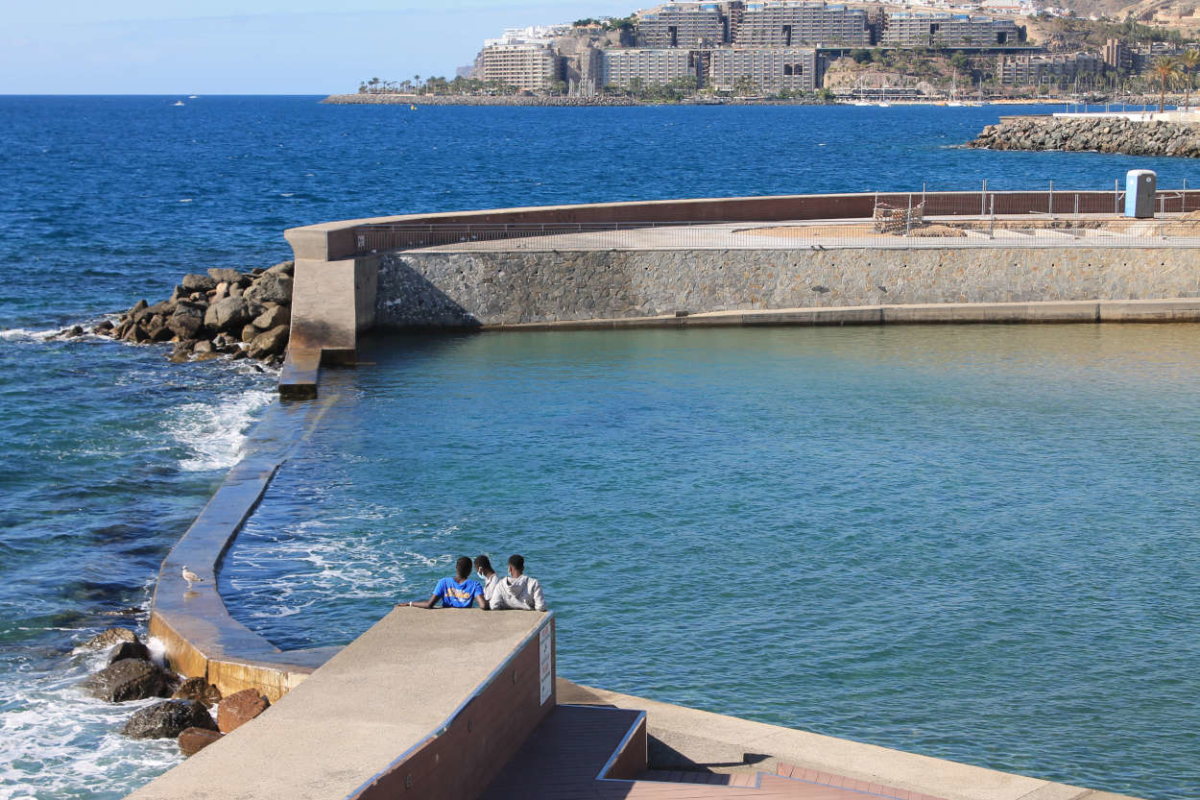The Canary Islands as setting of the new border play
Andrea Gallinal Arias
Master’s thesis, Political dynamics and changes in societies,
Institute of Political Studies, Aix-en-Provence, 2021
In this thesis I aim to explore the convergence of the Covid-19 pandemic and the migratory event that has taken place in the Canary Islands archipelago, Spain, during the year 2020, focusing more specifically on the island of Gran Canaria. In this sense, I question the development of this event into a crisis and the effects of the consequent urgency management on the reconfiguration of the actors and the materiality of the European border of the Canary Islands. I also address the transformations of the insular political landscape since this event and the rise of the extreme right. The objective of this thesis is to think, through the example of the Canary Islands, the effect that the Coronavirus pandemic will have on other European borders.
The Atlantic migratory route of the Canary Islands, considered virtually obsolete for the past ten years, returned to the forefront of the international scene during 2020. Indeed, the Spanish authorities reported an 881% increase in the number of migrants arriving on its shores compared to 2019 (EP, 2021). Some 22,000 people reached the islands from various enclaves in Morocco, Western Sahara and West Africa, a trend that has continued during this year 2021 (Bautista, 18 May 2021). While this figure may seem relatively low compared to other border areas of Europe, the archipelago has been completely overwhelmed by this situation, mainly due to the already complex context generated by the Covid-19 epidemic.
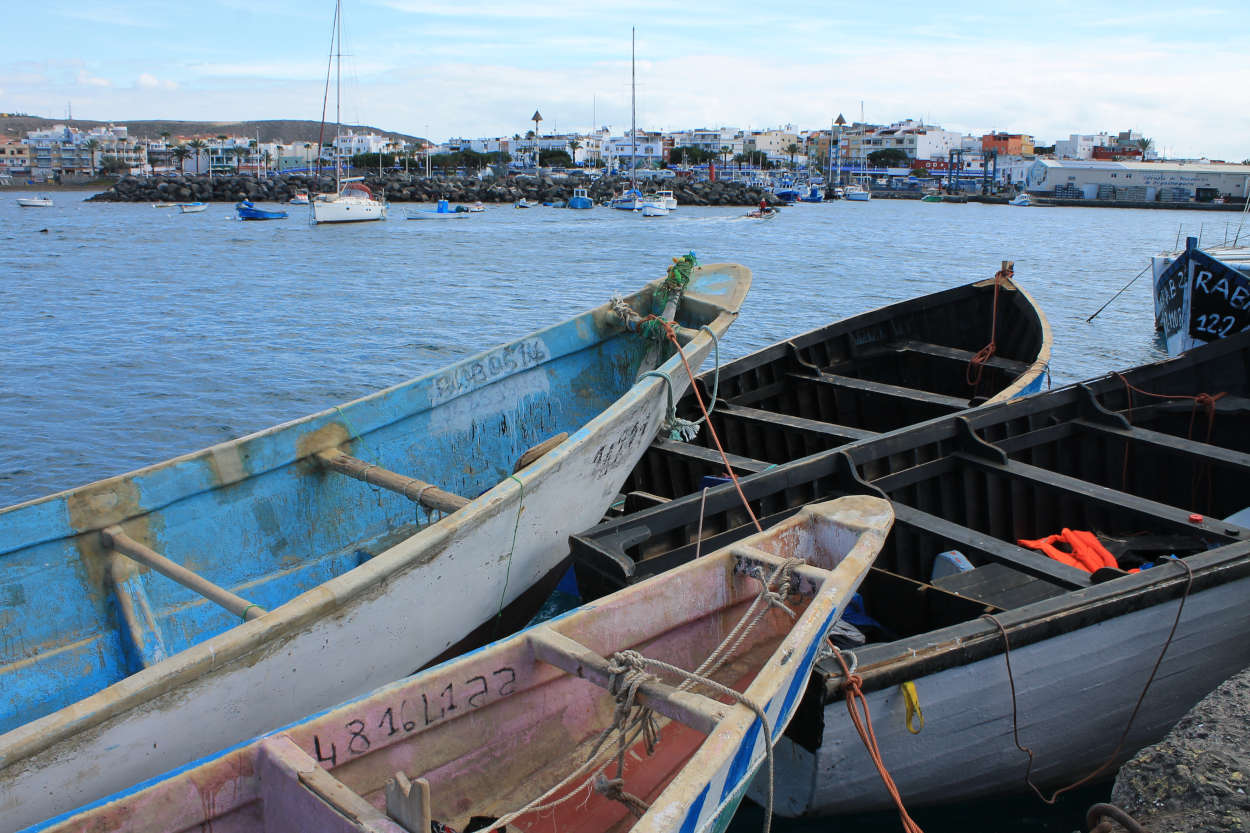
I approach this sudden arrival of migrants as an event in the sense that Alain Badiou defines it, that is, as a process through which the arising of a situation disables the operative modes by which we compose with our environment (Badiou, 2007). Here, the sudden and radical emergence of excluded populations on the social scene, in this case irregular migrants, came to disrupt the appearance of normality and opened up a process of reconfiguration of reality. Although the arrival of irregular migrants to the Canary archipelago is a recurrent phenomenon and, in this sense, predictable, its articulation with the Covid-19 pandemic created an unprecedented event on the island that left this part of the European border without the tools to cope with the situation. Border management in the islands in the current epidemic context has had to be adapted through new mechanisms and actors to ensure that migrants are managed in accordance with health restrictions. The lack of logistical and strategic preparation of the archipelago to respond to this event generated an institutional bricolage that has been, as I have been able to observe on the field, a source of contradictions and vulnerabilities at every level: a migrant reception system completely surpassed in terms of numbers; poor reception structures which have had to be assisted with new ones like hotels or macro camps; exhausted politicians and social workers; desperate and confused immigrants; and a polarized local population succumbing to conspirative theories and xenophobic demonstrations.
In this sense, the objective of this thesis is to analyze how the emergence of Covid-19 led to the collapse of the fragile reception system on the Canary Islands and forced a deep reconfiguration of the border infrastructure and policy and, as a consequence, of the collectives involved in its formal and informal functioning. The question of the impact of the pandemic on the ways in which Europe’s borders are managed seems significant for two reasons. Firstly, the spread of Covid-19 vaccines does not necessarily seem to guarantee the end of the pandemic, as the tendency already shows in some countries (Genoux, 11 April 2021). Second, the fact that vaccination policies are only implemented in the most privileged countries may confer to international mobility a key role in the evolution of the health situation (Héran, 2020), as shown by the creation of the WHO Global Program for Health and Migration (WHO, 2020). In this sense, the analysis of the reconfiguration of the European border scenario in the Canary Islands could, through a magnifying effect, provide an illustration of the questions that the pandemic will raise in the years to come in terms of border and mobility management in Europe.
My questioning revolves around three main axes: the transformation of a migratory event into a crisis; the responses of the different actors involved and the impact of these actions on the borderscape of the island; and the articulation of the migratory event with the transformation of the archipelago’s political composition.
First, I address how the migratory event in the island of Gran Canaria has been progressively enacted as a crisis. As Cuttitta explains for the island of Lampedusa, crises are usually created and “performed” through political measures and practices as a means of governing migration (2014), which allows for the implementation of further control procedures. Moreover, islands are particular places that, in relation to migration, attract extraordinary media attention (Bernardie-Tahir & Schmoll, 2014; Cuttitta, 2014) and where the reality and implications of irregular migration take exacerbated forms (Bernardie-Tahir and Schmoll, 2014), making it easier to enact migratory crises. In this sense, I suggest that the emergency measures deployed for the management of the Coronavirus pandemic in the Spanish territory have facilitated the reconfiguration of this migratory event into a crisis. It seems appropriate then to question the articulation between the pandemic and the migratory event, and the further becoming of a perceived crisis, as well as what actors are involved in this process.
Secondly, I discuss how the reactions of the authorities and the local actors deployed in order to master the crisis have contributed to the transformation of the Canarian borderscape. I privilege the notion of borderscape over that of border because, on the one hand, it allows me to highlight the fluid and changing nature of borders (Bernardie-Tahir & Schmoll, 2014; Brambilla, 2014) and to focus on the relations between the different collectives that compose it: the confrontations, contradictions, alliances and concessions at different levels that emerged in this changing context. On the other hand, it allows me to delocalize the border both in space and in time (Brambilla, 2015; Perera, 2007), apprehending all the actors -human or not- who intervene before in time and far in space: this is the case of the European directives and laws that have a central role in this matter in the territory of the Canary Islands.
In this sense, I focus on how the response to the migratory “crisis” has reconfigured the relationships between the different actors present in this space, as well as on the emergence of new actors. Several authors have studied the emergence of citizen organizations and NGOs as a response to migratory urgencies (Cuttitta, 2018; Danese, 2001), however, during my fieldwork I was able to observe the emergence of private actors acquiring a central role in the reception system. In the gap generated by the lack of means of the Spanish State, owners of different hotels have managed to organize themselves in the aim of offering a dignified response to the reception urgency on the island. Other actors, already existing, have had to adjust their operating modes to adapt to the sanitary situation. I assess the changes provoked by these reactions at the level of the local collectives: the redistribution of roles, their compositions, their limits.
Finally, I address the transformations of the political and social fabric of the island through the management of the migratory event. During my stay in Gran Canaria, I could clearly see the emergence and upsurge of a hitherto unknown xenophobic discourse as well as new practices and forms of solidarity. This allows me to posit that the migratory event goes beyond the logistical and strategic management of the phenomenon, but also impacts the political composition and the collective imaginary of a society. In this sense, I address the reactions of the local population to the management of the migratory situation, as well as the political instrumentalization of this event by extreme right-wing political parties.
Methodology, sources and fields
This research study is the result of a two-month fieldwork conducted during January and February 2021 in the island of Gran Canaria. My study is based on three types of materials for analysis: ethnographic work in different environments during my stay on the island, interviews with different representatives of collectives involved in the field of migration management and press articles through which I have been able to build a chronology of events, both during my stay on the island and from a distance before and after my fieldwork.
In relation to my ethnographic work, I was able to obtain first-hand information through participant observation during my work as a volunteer in two large associations that managed two different immigrant reception centers. After a little less than two weeks on the island of Gran Canaria, I was able to start working as a volunteer Spanish teacher in one of the centers for migrant women of the White Cross Foundation . This first contact with the organization allowed me, later during my stay, to visit one of the macro-camps built to respond to the migratory situation on the island, as it was managed by the same association. Some time later, I was also able to join the team of the Integral Reception Center (CAI) of Tafira, on the outskirts of the capital city of Las Palmas, managed by the Red Cross. This center, where I also worked as a Spanish teacher, welcomed families only from Morocco and Western Sahara. Both experiences were particularly enriching on a personal level, especially in relation to the interpersonal relationships I was able to establish with several of the residents. In addition, it gave me access to first-hand accounts of the different phases of the migration project of the migrants and the attention received upon arrival on the islands. It was also a very good opportunity to see from the inside how this type of temporary reception resources works at an institutional and human level.
In addition to this type of participant observation, I also employed diffuse observation, very common in anthropology, for describing on my fieldwork diary both the places and the practices that I observed within these different environments. This technique was especially useful to me during explorations in the different neighborhoods where the macro-camps had been established, and also during my various trips to the south of the island, where I focused mainly on observing the tourist structures, empty due to Covid-19, and the new shape the landscape took with the presence of the hundreds of migrants. Apart from the ethnographic work, I was also able to conduct a total of six interviews with different representatives of organizations and actors involved in one way or another in the management of migrant reception on the island of Gran Canaria.
During my encounters with the migrants themselves, I decided to favor an informal conversation format over that of an arranged interview as it seemed more appropriate to the context. Given the situation in which many of them found themselves upon their arrival on the islands – confused, having lived through moments of great tension, sometimes traumatic, and very wary about the type of relationship they established – informal conversations seemed to me the best option to favor the building of a relationship of trust and also to preserve and respect the situation of vulnerability in which many of them found themselves.
The relationships I was able to establish with migrants, both inside and outside the reception structures, have been the most enriching part of my fieldwork. However, they were also the most complex: since most of the migrants I was able to talk to outside the reception centers were in difficult situations, where they felt desperate and frustrated, I quickly understood that my efforts to reach out to them could quickly turn into a relationship of dependency. If I provided my phone number for future contact, I received messages and calls at all hours. In this sense, I had to take some time to understand where and how to set the boundaries in this type of relationship. I decided, upon reflection, that I was indeed interested in establishing human relationships beyond my object of study. I did not want to simply obtain information from these people and ignore their personal situation. But to do so, I had to be quite selective in who I facilitated my personal contact to and who I did not. Thus, although my exchanges were multiple and with many different immigrants, I privileged to establish a relationship of trust with a total of four people whom I saw regularly and with whom I was also personally involved . This selectivity allowed me to have privileged access to first-hand information about the situation in the different hotels and the material and psychological experiences inside them, without having to neglect the personal relationships established since I had time to answer any messages or calls.
Finally, since the beginning of October 2020 I started working on a press review with different articles published by different digital media. This allowed me to have an exhaustive chronology of all the important events that were happening as the situation evolved. It also allowed me to track the reproduction of the facts in the media, which also facilitated the identification of discourses positioned against and in favor of the migrants’ stay on the island. Working with written press in various languages (Spanish, English, French) has also allowed me to analyze how the events have been perceived in the international sphere.
Through these three sources of information, I have been able to construct my analysis of the situation in the Canary Islands before, during and after my fieldwork on the island of Gran Canaria.
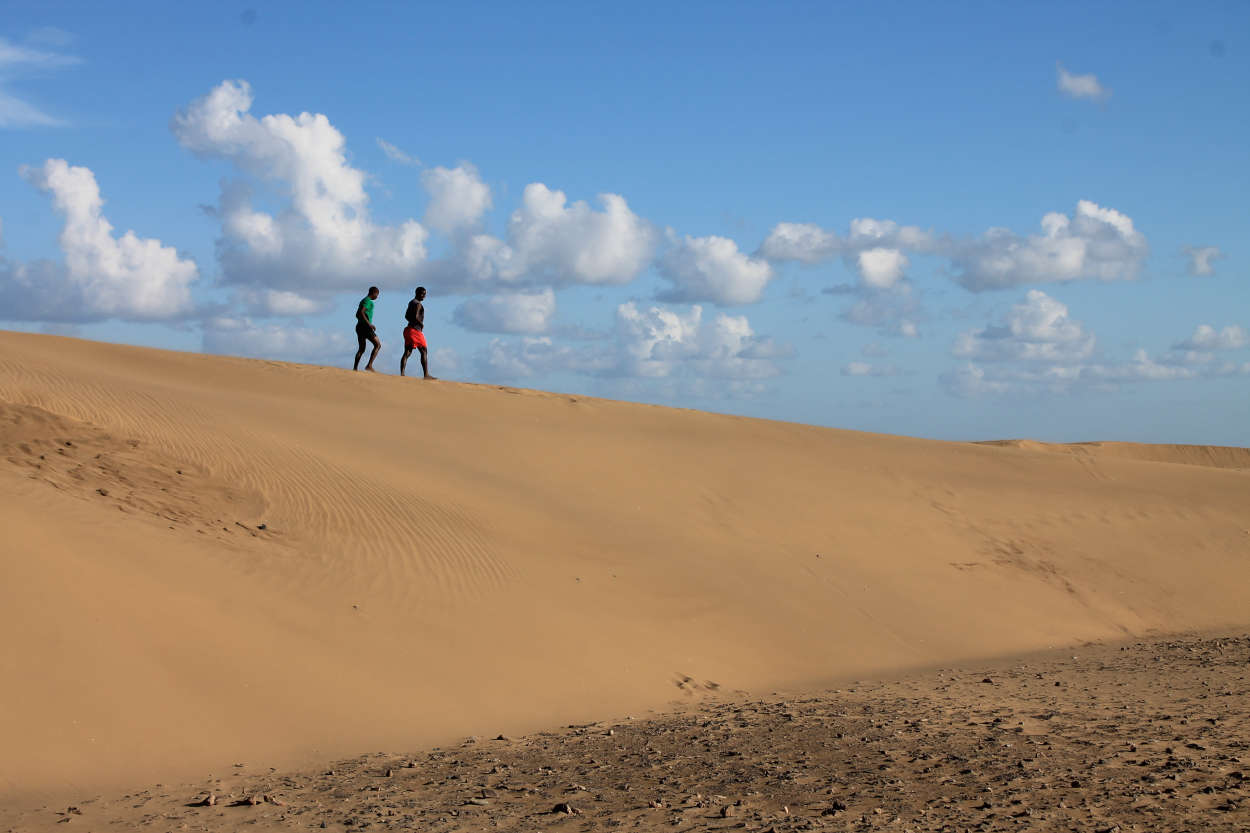
Challenges during my fieldwork: reflections on gender
There is an important element that has stood out during my fieldwork that I would like to address separately because of the scarce information I have found on this topic: being a female researcher in contact with mainly men interlocutors. I will be discussing here only the part of my fieldwork related to my contact with migrants themselves outside of the reception centers in which I gave Spanish lessons.
All the migrants I was able to see and talk to, with the exception of the two centers where I worked as a volunteer, were young men. In this sense, sexist or sexualized behavior and comments were quite recurrent. Gurney describes sexual hustling to which female researchers are often exposed, as a “range from flirtatious behavior and sexually suggestive remarks to overt sexual propositioning” (1985). One of the biggest difficulties during my approach to young male migrants was the constant attempts at flirting that completely discredited the position of researcher in which I wanted to maintain myself. Usually, three reactions were possible when I approached to talk to the young men: a shy, respectful response; an attempt to approach me with compliments and questions about my personal life and asking for my phone number; or, very often, they just wanted to take pictures of or with me. The latter two reactions were quite uncomfortable and, although sexual hustling behavior is not something specific to this particular context, since I face it on my daily life, in this situation there was an added difficulty: how should I react?
Gurney points out that a “modicum of tolerance is necessary with respect to any behavior respondents may exhibit, otherwise very little field research would ever be accomplished”, but “the question of where to draw the line” and how is a rather difficult one (1985). Obviously, I could not react in that context as I would react in my day-to-day life because it was in my interest to get close to these people. The ability to speak French greatly facilitated my approach to the migrants I met on the island. As they told me, being ignored by most of the local population, if not relatively mistreated, made my approach an unusual event. This was very commonly interpreted on their part as an interest of a romantic or sexual nature. Several of the people with whom I established more solid contact explained to me that they did not understand why I was so nice to them compared to the rest of the people they met. At first, I was forced to constantly justify my kindness to them, not as a romantic interest, but simply out of respect. Questions about my marital status, if I had a boyfriend, if I was married, were a regular occurrence.
In the face of compliments and comments regarding my physical appearance, I tried to ignore them or simply smile. Little by little, I began to develop mechanisms with which I could avoid the uncomfortable questions regarding my personal life. I noticed that, as Gurney points out, “sexual hustling is more likely to occur when the female is perceived as single or unattached to a male” (1985). So, I began to reply on every occasion that I was married, which seemed to be pretext enough to combat the harassment, at least to some extent. Even so, I still had to face situations in which I found myself certainly uncomfortable. Of particular note was a moment when one of my interlocutors repeatedly tried to kiss me on the mouth, even when I made it clear that I was not at all interested. On another occasion, another person with whom I tried to establish contact insisted that he wanted to marry me, even when I told him I had a partner. Again, on these occasions, finding the right reaction was not easy and, thinking about it in perspective, I think I should have reacted more strongly. However, the situation of vulnerability in which these people found themselves also made me not want to generate further conflict with them.
Being a woman, in this context, has also been beneficial because it has made it easier for me to approach my interlocutors, even if it has generated undesired situations. It is clear that if I had been a man, I would not have had to endure many of the comments, looks or behaviors that I have had to face as a woman, but it is also likely that a male presence and an eventual approach as a man would have generated more distrust in my interlocutors. Being a young woman has been, in this sense, both an advantage and a disadvantage.
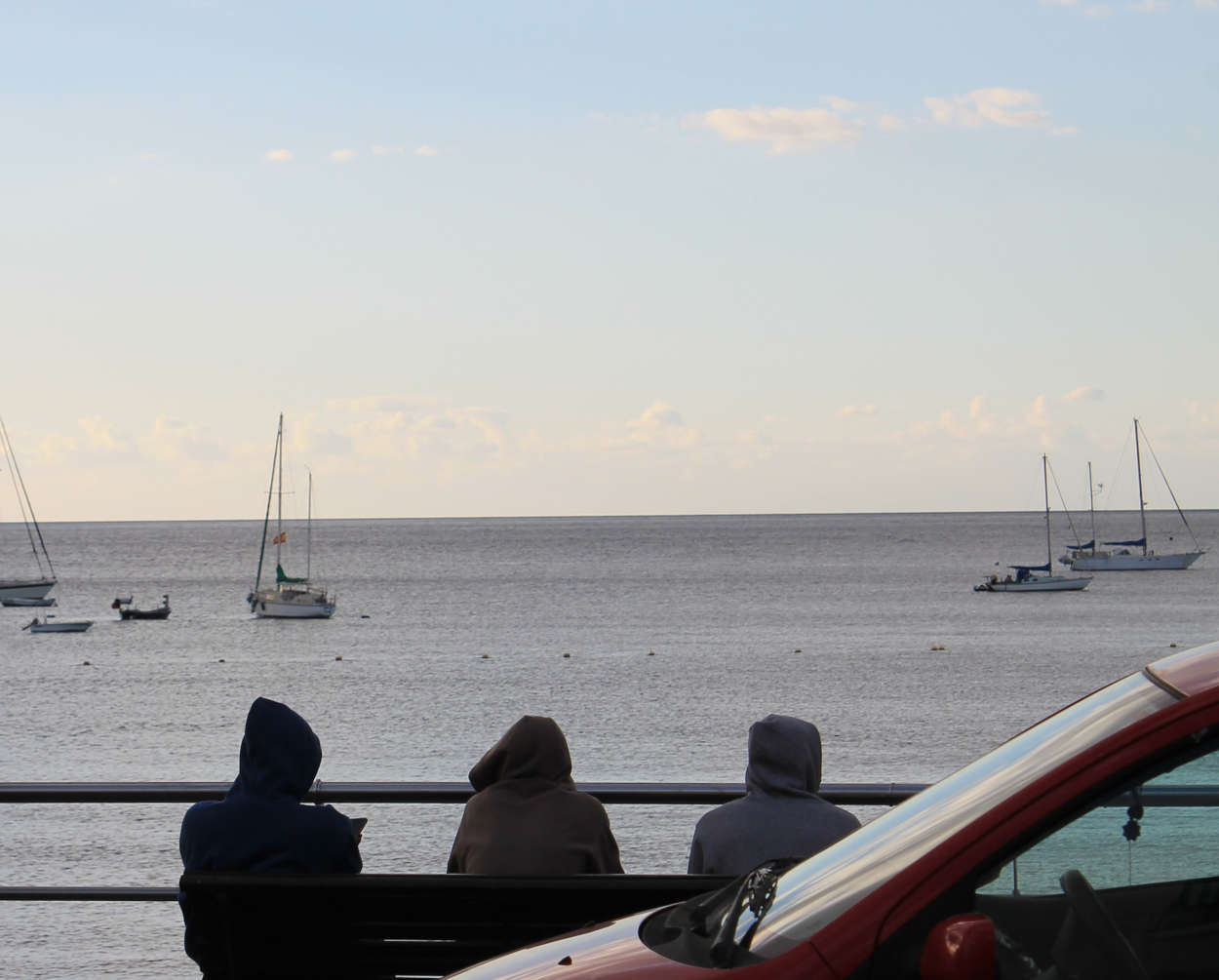
Contents
This thesis consists of three parts and eight chapters. The division of the different parts corresponds to the explanatory logic that guides the analysis.
In the first part, I contextualize the convergence of the pandemic and the migratory event in the islands and question its supposed unpredictable character. I also examine the construction of this double event as a crisis and how this categorization has impacted the evolution of the different institutional emergency mechanisms developed during the last months. Finally, I establish a comparison between the migratory situation of the Canary Islands during 2020 and that of the island of Lampedusa during the same period, with the aim of contextualizing the situation of the Spanish archipelago in a broader European panorama.
In the second part of this thesis, I focus on the different phases of development and implementation of migration management and reception systems. I intend to present here the reconfiguration of the Canarian borderscape through the recomposition of the different collectives that constitute it. After a first moment in which the lack of means and resources on the part of the central government became evident, the latter launched the Plan Canarias, a road map that aimed to put an end to the emergency situation experienced up to that moment. In this sense, I focus here on the use of hotels as temporary reception centers and all their implications, and the implementation and management of the different macro-camps established on the island of Gran Canaria through this new plan.
Finally, in the third part, I focus on the implications of the new migratory infrastructure that emerges through the recomposition of the borderscape of the islands. Thus, I analyze the new practices of this system, based on constrained mobilities and expanding temporalities for the migrants. I also address the social and political consequences resulting from the emergency management of this double event. In this sense, I refer mainly to the increase and expansion of xenophobic discourse on the island, and the instrumentalization of this unrest by various political formations, especially of the extreme right, in order to gain political leverage.
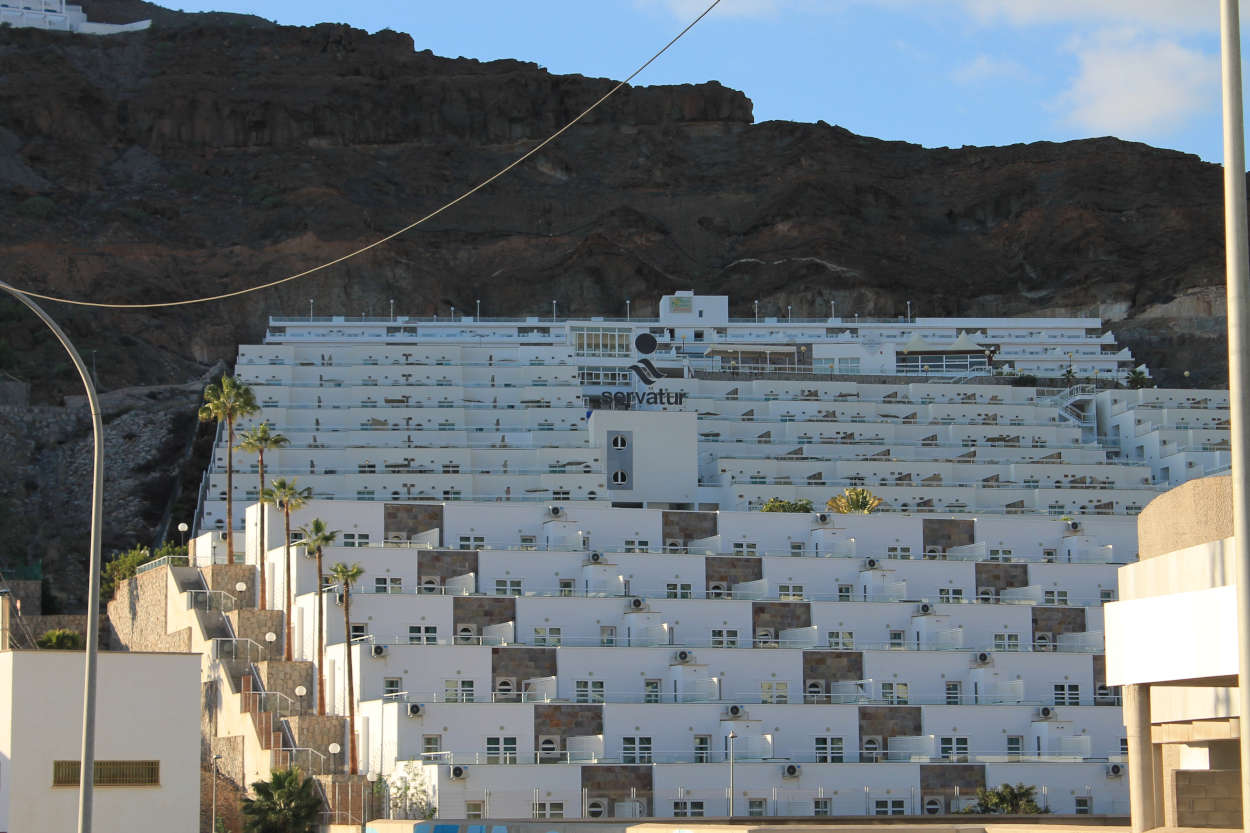
Bibiography
Badiou, A. (2007). Being and event. A&C Black.
Bautista, L. (18 May 2021). La immigración en Canarias ha aumentado un 133% en los primeros
4 meses de 2021. ABC, págs. https://www.abc.es/espana/canarias/abci-inmigracion-
canarias-aumentado-133-por-ciento-primeros-4-meses-2021-
202105061202_noticia.html.
Bernardie-Tahir, N., and Schmoll, C. (2014). “The uses of islands in the production of the southern
European migration border”. Island Studies Journal, 3-6.
Brambilla, C. (2015). “Exploring the Critical Potential of the Borderscapes Concept”. Geopolitics, 20:1, 14-34.
Cuttitta, P. (2014). “Borderizing the island setting and narratives of the Lampedusa border play”.
ACME: An international journal for critical geographies, 13(2), 196-219.
Cuttitta, P. (2018). “Repoliticization through search and rescue? Humanitarian NGOs and
migration management in the Central Mediterranean.” Geopolitics, 23(3), 632-660.
Danese, G. (2001). “Participation beyond citizenship: migrants associations in Italy and
Spain”. Patterns of prejudice, 35(1), 69-89.
EP. (2021, January 02). La llegada de inmigrantes a las costas canarias creció en 2020 un 881%
respecto a 2019. ABC, pp. https://www.abc.es/espana/abci-llegada-inmigrantes-
costas-canarias-crecio-2020-881-por-ciento-respecto-2019-
202101021157_noticia.html?ref=https://www.google.com/.
Genoux, F. (11 April 2021). “Covid-19 : malgré une vaccination massive, l’épidémie est hors de
contrôle au Chili”. Le Monde, https://www.lemonde.fr/planete/article/2021/04/11/au-chili-l-epidemie-est-hors-de-controle-malgre-une-vaccination-massive_6076368_3244.html.
Gurney, J. N. (1985). “Not One of the Guys: The Female Researcher in a Male-Dominated
Setting”. Qualitative Sociology, 42-62.
Héran, F. (2020). “Voyageurs internationaux ou immigrants, le virus ne fait pas la différence”. De
facto, vol. 18, 38-41.
Perera, S. (2007). “A pacific zone? (In)Security, Sovereignty, and stories of the Pacific
borderscape”. In P. K. Rajaram, & C. Grundy-Warr, Borderscapes: hidden geographies
and politics at territory’s edge (p. 201-227). University of Minessota Press.
WHO. (2020). ApartTogether survey: preliminary overview of refugees and migrants self-
reported impact of COVID-19. World Health Organization.
Main photo: Andrea Gallinal, 2021
